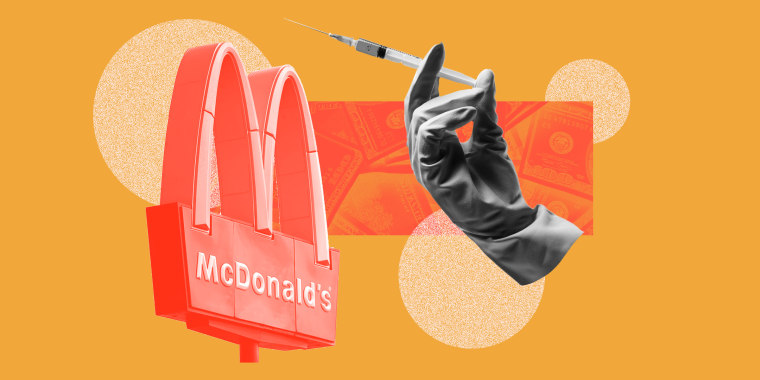McDonald's is joining the ranks of companies offering to pay employees to receive the COVID-19 vaccine, announcing that they will provide four hours of paid time to employees who get inoculated against the virus.
"Vaccination is essential in the fight against the pandemic, and we are actively encouraging McDonald's employees to take this important step," said Tiffanie Boyd, the U.S. Chief People Officer at McDonald's, in a statement. The paid time is available to crew at McDonald’s corporate-owned U.S. restaurants and U.S. corporate employees.
The company confirmed to TODAY Food that employees will not be required to get the vaccine. Instead, McDonald's will "encourage vaccination and connect employees to trusted, third-party experts" who can "provide important information and answer questions they have on the vaccine."
In addition to supporting vaccination efforts and encouraging workers to get vaccinated, McDonald's said it has "updated nearly 50 processes" in U.S. locations to "keep restaurant employees and customers safe." According to the company, these standards include "wellness checks, protective barriers, adhering to social distancing guidelines for customers and crew, using gloves and masks, increasing the frequency of hand washing and moving to contactless operations." The chain also said it provides an "ample supply" of personal protective equipment (PPE) to all restaurants and has distributed 111 million masks to date.
Food and restaurant workers have been hit particularly hard by the pandemic. Data from One Fair Wage, an advocacy organization for restaurant workers, found that 44% of workers surveyed reported that "at least one or more of their co-workers in their restaurant had contracted COVID-19." Nearly 9 in 10 workers said that they knew someone who had contracted the coronavirus, and 42% reported knowing someone who had died.
Earlier in the pandemic, two McDonald's workers were shot by a patron who refused to leave the restaurant's dining area, which was closed to allow for social distancing. A third employee was hurt in the scuffle; all three victims recovered. In June, a 19-year-old McDonald's cashier in California was physically attacked after asking a customer to wear a mask in the store's drive-thru.
The pandemic has also had a financial impact: 83% of restaurant workers surveyed by One Fair Wage said their tips have decreased by between 50 and 75% since the start of the pandemic. A fear of losing money makes it difficult to enforce social distancing and masking rules: Nearly 60% of workers surveyed said they "could not" enforce those restrictions "for fear that they would lose more money in tips."
According to the Centers for Disease Control and Prevention (CDC), food service workers should be in Phase 1(c) of the vaccination process, putting them just behind high-risk healthcare workers, elderly citizens and frontline essential workers. According to CNBC, the National Restaurant Association has requested that those who work in food service be prioritized during the vaccine distribution process.
"Prioritizing testing and vaccine distribution will help ensure the food supply chain for our communities ... The Association continues to engage with the Administration on vaccine distribution planning and the State Restaurant Associations are working to ensure restaurant workers continue to be considered essential to food security and are prioritized in their state vaccine rollout plans," said Sean Kennedy, executive vice president for Public Affairs for the National Restaurant Association, in a statement to CNBC.
Boyd said that McDonald's is "engaging with government officials and our partners to understand where" the fast-food chain can further support vaccination distribution efforts.
"Ensuring widespread availability and access to the vaccine will require extraordinary partnerships between businesses, governments, and community and health organizations," said Boyd.


